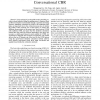Free Online Productivity Tools
i2Speak
i2Symbol
i2OCR
iTex2Img
iWeb2Print
iWeb2Shot
i2Type
iPdf2Split
iPdf2Merge
i2Bopomofo
i2Arabic
i2Style
i2Image
i2PDF
iLatex2Rtf
Sci2ools
115
Voted
IRI
2005
IEEE
2005
IEEE
Comparing similarity calculation methods in conversational CBR
Abstract— Conversational Case-Based-Reasoning (CCBR) provides a mixed-initiative dialog for guiding users to construct their problem description incrementally through a question-answering sequence. Similarity calculation in CCBR, as in traditional CBR, plays an important role in the retrieval process since it decides the quality of the retrieved case. In this paper, we analyze the different characteristics of the query (new case) between CCBR and traditional CBR, and argue that the similarity calculation method that only takes the features appearing in the query into account, so called query-biased, is more suitable for CCBR. An experiment is designed and executed on 36 datasets. The results show us that on 31 datasets out of the total 36, the CCBR system using the query-biased similarity calculation method achieves more effective performance than those using case-biased and equally-biased similarity calculation methods.
Information Retrieval | IRI 2005 | Similarity Calculation | Similarity Calculation Methods | Traditional Cbr |
Related Content
| Added | 25 Jun 2010 |
| Updated | 25 Jun 2010 |
| Type | Conference |
| Year | 2005 |
| Where | IRI |
| Authors | Mingyang Gu, Xin Tong, Agnar Aamodt |
Comments (0)

